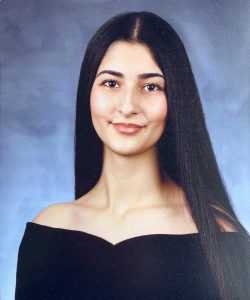Name: Selin Kocalar
Hometown: Los Gatos, California
Hobbies: Playing the bassoon, reading historical fiction literature, practicing pilates
Affiliation: Leigh High School graduate, incoming freshman at the Massachusetts Institute of Technology
What do you study?
Safeguarding astronaut health is of utmost importance as humans prepare to explore more distant reaches of the solar system. Biosensors, which are biological devices engineered to “sense” certain molecules, can be used to develop the diagnostics necessary to protect astronaut wellbeing. I work on the Genes in Space-9 investigation, which tests whether biosensors are functional aboard the International Space Station. If successful, this study will lay the foundation for applications of biosensors in space, such as diagnosing medical conditions, detecting food and water contaminants, and screening environmental markers on planets.
Why is it important?
Monitoring astronaut health in space—where there are no easy-access walk-in clinics as on Earth—creates the challenge of effectively protecting astronaut wellbeing and resolving medical issues in the resource- and time-limited spacecraft environment. Biosensors address this challenge by providing rapid, portable detection systems to identify potential threats to astronaut health, to prevent astronauts from developing diseases, and to diagnose diseases they have already developed. In the future, biosensors could have broad applications in space, from point-of-care detection of infectious agents to the design of spacesuits embedded with diagnostics.
What piqued your interest in science?
Currently, researchers are investigating innumerable questions in science, from how the fundamental process of cell division works to how effective medical therapies can be developed, yet each scientific finding inspires more questions than answers it unlocks. It is these limitless questions, waiting to be probed, that pique my curiosity in science.
What do you like about being a scientist?
I enjoy the circuitous journey from hypothesis to conclusion that I get to embark on as a scientist. No scientific study is ever a straightforward, simple process. There are always obstacles and redirections—each of which challenges us to harness our creativity and resiliency as we gain deeper insight into our research focus. For this reason, every scientific journey becomes a unique adventure for the researcher.
What are 5 general vocabulary terms someone should know going into your field of science?Spaceflight, astronaut health, diagnostics, gene expression, fluorescence
What are 5 specific vocabulary terms someone should know about your research?
Biosensors, cell-free technology, plasmid, aptamer, toehold switch

